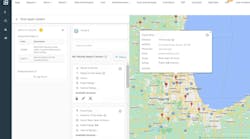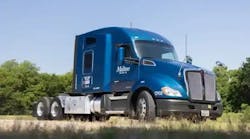Getting a true reading on biodiesel's operational impact requires a lot of time and many miles — along with a carrier willing to put its trucks online.
Decker Truck Line made that commitment last year, signing up for a 2-million-mi. test comparing B20 — a blend of 20% soybean-based biodiesel mixed with 80% regular petroleum diesel — in nine trucks against a control group of 10 trucks using petrodiesel.
Started in Fort Dodge, IA, with one Model B Ford truck in 1931, Decker operates a fleet of 700 trucks and 1,400 flatbed trailers from nine terminals in five states. Running mainly Peterbilt 379s, 388s and 389s powered by C13 or C15 Caterpillar engines built to EPA 2004 and EPA 2007 emissions levels, Decker partnered with the Iowa Soybean Assn., National Biodiesel Board (NBB), U.S. Dept. of Agriculture, Iowa Central Community College and Renewable Energy Group to conduct the testing.
Dale Decker, the industry and government relations director for the company and a third-generation trucker in the family business, noted that the carrier got involved in the project because it wanted to use B20 to compensate for the lower lubricity of ultralow sulfur diesel (ULSD).
Researchers from Iowa Central Community College collect and analyze data downloaded from a Qualcomm onboard system in each of Decker's trucks, including miles per gallon, total miles, idle time, maximum speed, and average speed. The test is still ongoing, however, interim results released after 500,000 mi. revealed several things.
For starters, trucks operating on B20 got slightly lower fuel mileage. The college's researchers found average fuel consumption for the control group of 10 trucks was 6.01 mpg, while average consumption for the B20 group was 5.80 mpg, or 3.5% lower than the control group.
Though winter driving produced relatively few problems with cold-flow issues, fuel for both groups was treated with a commercial fuel additive, and No. 1 diesel (a 40% blend) was used for a brief time during a severe cold snap. While none of the test truck drivers experienced fuel gelling problems, several reported isolated episodes of fuel filter plugging.
On the positive side, regular oil analysis found the trucks operating on B20 had cleaner engine oil, less engine wear, and required less maintenance due to increased fuel lubricity. The carrier credited the use of high-quality biodiesel, manufactured to national B100 standards, with preventing cold weather issues — even with temperatures in the teens and single digits.
Results will continue to be posted from the study online at www.2millionmilehaul.com.


